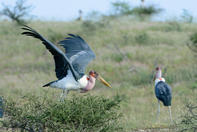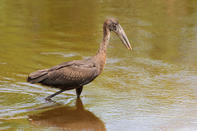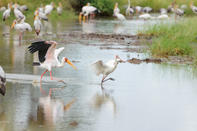Marabou Stork
Marabou storks are exceptionally opportunistic. They make a living by scavenging food that vultures work free of carcasses as they can not cut meat themselves with their straight bills.

They also typically monopolise on the abundance of catfish that become trapped in drying pools towards the end of the wet season. They use their feet to stir up the shallow muddy water to disturb fish which they then locate by sight or feel and stab viciously at them with sharp beaks.
The fish are swallowed head first so that scales and fins are aligned correctly and don’t cause the stork to choke. Marabous have the unsanitary habit of urinating on their legs to cool down, leaving them characteristically whitened.
Openbill Stork

The Openbill Stork’s bill is another of the avian world’s unique creations. The bill is open between the upper and lower mandibles creating a space about 6mm wide and touching only at the base of the bill and at the tip. This is an adaptation to processing molluscs and provides structural reinforcement.
The openbill stork locates a snail or mussel by probing, bill ajar, in the mud. On locating a morsel, it pins it down with the upper mandible and expertly uses the lower one like a knife blade to remove the soft tissue from the shell without breaking the shell.
Yellow-billed Storks

By Megan Emmett